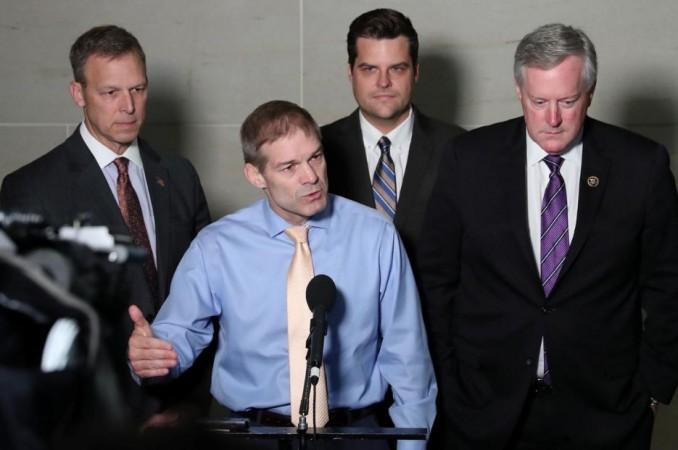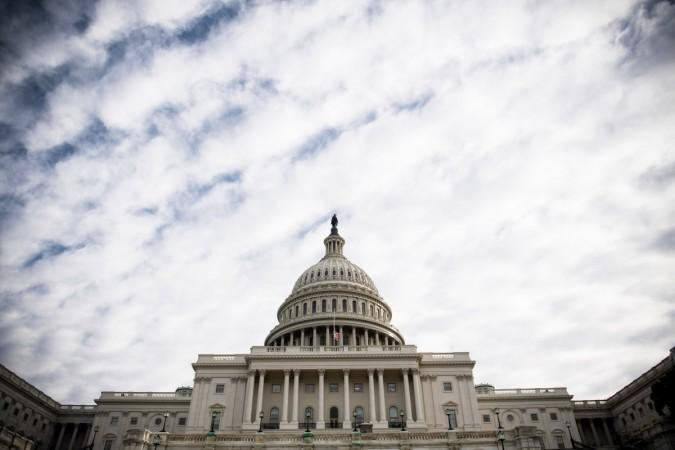The White House said on Tuesday it would refuse to cooperate with an "illegitimate, unconstitutional" congressional impeachment inquiry, setting Republican President Donald Trump on a collision course with the Democratic-led US House of Representatives.
Hours after the administration abruptly blocked a key witness in the Ukraine scandal from testifying to congressional panels, White House lawyer Pat Cipollone criticized the decision by lawmakers to proceed with an impeachment inquiry without a full House vote.
"You have designed and implemented your inquiry in a manner that violates fundamental fairness and constitutionally mandated due process," he said, adding House Democrats had left Trump "no choice."
"To fulfill his duties to the American people, the Constitution, the Executive Branch and all future occupants of the Office of the Presidency, President Trump and his administration cannot participate in your partisan and unconstitutional inquiry under these circumstances," he said.
In the White House's most aggressive response to the inquiry yet, the State Department had said earlier the US ambassador to the European Union, Gordon Sondland, a Trump political donor, would not be allowed to appear before what Trump decried as a "kangaroo court."
Democratic lawmakers denounced the effort to block testimony from Sondland, who had already flown in from Europe for the appearance, calling it an attempt to obstruct their inquiry. They issued a subpoena compelling him to appear on October 16 to submit to questions.
The State Department did not respond to requests for comment on why Sondland had been blocked from speaking to lawmakers just hours before his scheduled appearance.

The Ukraine investigation has cast a pall over Trump's campaign to win back the White House in 2020. A whistleblower complaint about a July 25 phone call in which Trump pressed his Ukrainian counterpart, Volodymyr Zelenskiy, to investigate his political rival, former Vice President Joe Biden, prompted the inquiry.
Biden is a leading candidate among the crowded field of contenders seeking the Democratic nomination to face Trump in the November 2020 election.
Trump has denied he did anything wrong in the phone call.
The investigation could lead to the approval of articles of impeachment - or formal charges - against Trump in the House. A trial on whether to remove him from office would then be held in the US Senate. Republicans who control the Senate have shown little appetite for ousting Trump.
'NAKED POLITICAL STRATEGY'
The White House letter spelled out Trump's evolving strategy of stonewalling lawmakers' demands for witnesses and documents, while questioning the legality of the inquiry.
White House lawyer Cipollone described the probe as "a naked political strategy" that violated Trump's due process rights and was designed to reverse the 2016 presidential election and influence the November 2020 election.
"Your transparent rush to judgment, lack of democratically accountable authorization, and violation of basic rights in the current proceedings make clear the illegitimate, partisan purpose" of the inquiry, he said.
Legal experts said the US Constitution gives the House broad discretion to decide how to conduct an impeachment investigation and that the Supreme Court would not second-guess the procedures Congress adopts.
"They can do the investigation in more or less any order they want," said Frank Bowman, a law professor at the University of Missouri and the author of a book on impeachment.
But Bowman added: "Politically, it would certainly seem helpful to allow some participation by presidential representatives at some points."
During the impeachment investigation of President Bill Clinton, the House adopted procedures that allowed his lawyers to respond to evidence and make requests for witness testimony.

On a conference call with reporters, a senior administration official said Trump had not been given procedural protections granted in earlier impeachment proceedings, including "the ability to see evidence, to cross-examine witnesses, to have counsel present at all hearings, the ability to object to testimony and the ability to call witnesses."
House Democratic leaders had no immediate response to the letter. But rank-and-file members called the White House letter an act of desperation that would not stop their impeachment inquiry.
"Trump and his enablers continue to argue that the Constitution is unconstitutional," tweeted Democratic Representative Bill Pascrell.
Republican strategist Rick Tyler, a frequent Trump critic, said the White House letter "reads like a political press release."
"It doesn't seem to be based on any sound legal theory," he said.
'OBSTRUCTING CONGRESS'
A Reuters/Ipsos opinion poll conducted on Monday and Tuesday found support for impeachment unchanged among all Americans -holding at 45 percent since last week - but rising among Democrats. Opposition to impeachment also dropped by 2 percentage points from last week to 39 percent.
Among those who identify as Democrats, 79 percent said Trump should be impeached, up 5 percentage points from a similar poll that ran September 26 to 30. Only 12 percent of Republicans and about one in three independents supported impeachment, which is mostly unchanged.
Trump defended the decision not to allow Sondland to testify, writing on Twitter that he would "be testifying before a totally compromised kangaroo court, where Republicans' rights have been taken away, and true facts are not allowed out for the public ... to see."
Democrats view Sondland as a key witness who can help shed light on whether Trump withheld military aid to Ukraine as part of an effort to pressure it to investigate Biden and his son Hunter Biden. Trump has denied any linkage.
"The president is obstructing Congress from getting the facts. That is an abuse of power to act in this way," Democratic House Speaker Nancy Pelosi told reporters in Seattle.
According to text messages between Sondland and Trump's former envoy to Ukraine, released by House committee leaders last week, the two US diplomats sought to set strict conditions for Zelenskiy meeting Trump at the White House, including Ukraine drafting a statement committing it to carrying out the investigations sought by Trump.
Sondland placed a call to Trump after a top American diplomat in Ukraine expressed concern that Washington was linking the US military aid to a request for an investigation that would help Trump's political campaign, according to a person familiar with the matter.
A career diplomat, Marie Yovanovitch, is scheduled to meet with the committees behind closed doors on Friday. Yovanovitch was the US ambassador to Ukraine until Trump recalled her in May before her term was up, after the president's supporters questioned her loyalty.
A second whistleblower has come forward with direct knowledge of the allegations about Trump's efforts to get Ukraine to probe Biden.
Congressional staff and lawyers for the first whistleblower are close to making final arrangements for the witness to speak to congressional investigators away from Capitol Hill as early as this week, a source close to the parties said on Tuesday.

















